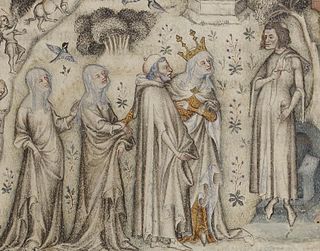See also
- Poetry
- 14th century in poetry
- 14th century in literature
- List of years in poetry
- Grands Rhétoriqueurs
- French Renaissance literature
- Renaissance literature
- Spanish Renaissance literature
Other events:
15th century:
| |||
|---|---|---|---|
| +... |
Nationality words link to articles with information on the nation's poetry or literature (for instance, Irish or France).
1361:
1365:
c.1367:
1368:
Death years link to the corresponding "[year] in poetry" article. There are conflicting or unreliable sources for the birth years of many people born in this period; where sources conflict, the poet is listed again and the conflict is noted:
1360:
1363:
1368:
1369:
Birth years link to the corresponding "[year] in poetry" article:
1361:
1365:
1367:
Other events:
15th century:

Guillaume de Machaut was a French composer and poet who was the central figure of the ars nova style in late medieval music. His dominance of the genre is such that modern musicologists use his death to separate the ars nova from the subsequent ars subtilior movement. Regarded as the most significant French composer and poet of the 14th century, he is often seen as the century's leading European composer.
This article contains information about the literary events and publications of 14th century.
A rondeau is a form of medieval and Renaissance French poetry, as well as the corresponding musical chanson form. Together with the ballade and the virelai it was considered one of three formes fixes, and one of the verse forms in France most commonly set to music between the late 13th and the 15th centuries. It is structured around a fixed pattern of repetition of verse with a refrain. The rondeau is believed to have originated in dance songs involving singing of the refrain by a group alternating with the other lines by a soloist. The term "Rondeau" is used both in a wider sense, covering older styles of the form which are sometimes distinguished as the triolet and rondel, and in a narrower sense referring to a 15-line style which developed from these forms in the 15th and 16th centuries. The rondeau is unrelated to the much later instrumental dance form that shares the same name in French baroque music, which is more commonly called the rondo form in classical music.

Medieval French literature is, for the purpose of this article, Medieval literature written in Oïl languages during the period from the eleventh century to the end of the fifteenth century.

Il Canzoniere, also known as the Rime Sparse, but originally titled Rerum vulgarium fragmenta, is a collection of poems by the Italian humanist, poet, and writer Petrarch.
Nationality words link to articles with information on the nation's poetry or literature.
Nationality words link to articles with information on the nation's poetry or literature.
Nationality words link to articles with information on the nation's poetry or literature.
Nationality words link to articles with information on the nation's poetry or literature.
Nationality words link to articles with information on the nation's poetry or literature.
Nationality words link to articles with information on the nation's poetry or literature.
Nationality words link to articles with information on the nation's poetry or literature.
Nationality words link to articles with information on the nation's poetry or literature.
Nationality words link to articles with information on the nation's poetry or literature.
Nationality words link to articles with information on the nation's poetry or literature.
Nationality words link to articles with information on the nation's poetry or literature.
Nationality words link to articles with information on the nation's poetry or literature.
Nationality words link to articles with information on the nation's poetry or literature.
Nationality words link to articles with information on the nation's poetry or literature.